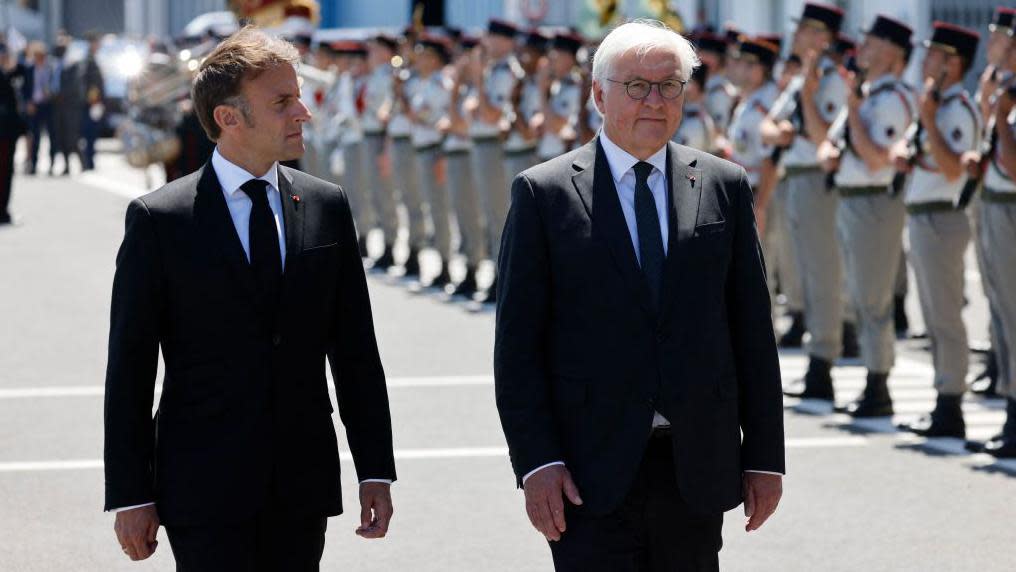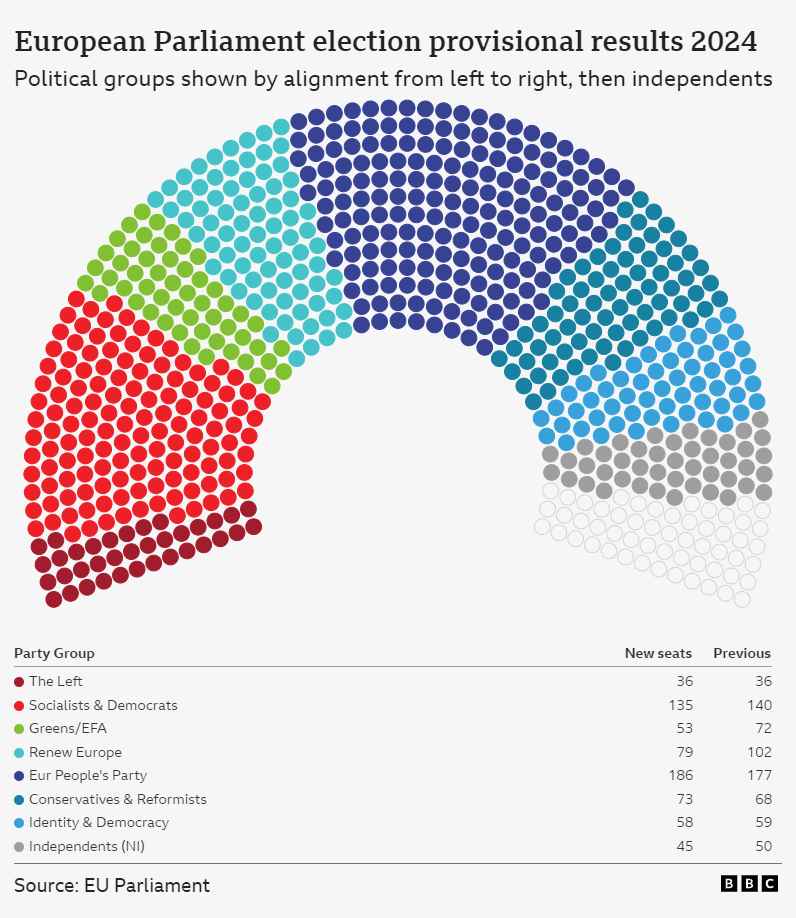Macron snap election leaves rivals stunned after EU vote

France's political leaders are scrambling to prepare for snap elections after President Emmanuel Macron dissolved parliament in response to a stinging European vote defeat by the far-right National Rally.
Finance Minister Bruno Le Maire has warned the two-round vote, starting on 30 June could have "the most serious consequences" in modern French history.
German Chancellor Olaf Scholz's Social Democrats were also heavily beaten in Sunday's European elections by the conservative opposition, but he has ruled out holding early elections.
The conservative CSU premier of Bavaria, Markus Söder, said Mr Scholz's government was essentially finished and needed to follow the French example.
Germany isn't scheduled to hold fresh elections until 2025, but Mr Söder said the "country needs a new start".
Macron ally Yaël Braun-Pivet, who's president of the National Assembly said there had been an alternative to new elections, which involved a government pact , but "the president decided that path wasn't open to him". Without a majority in parliament, the government relies on support from other parties to pass legislation.
There was also frustration from the Socialist mayor of Paris, Anne Hidalgo, that the vote was taking place three weeks before the capital hosts the Olympics.
Mr Macron's Renew party polled less than 15% of the vote on Sunday, while the anti-immigration National Rally (RN) of Marine Le Pen and young leader Jordan Bardella, secured more than 31%.
The decision to hold new elections came as a shock across the political spectrum, with reports of a hastily organised meeting involving top RN leaders and Marion Maréchal from rival far-right party Reconquête.
There were calls for France's bitterly divided left to rally round Socialist Raphaël Glucksmann, who scored almost 14% in the European vote.
President Macron joined German President Frank-Walter Steinmeier on Monday in the French village of Oradour-sur-Glane, to mark the 80th anniversary of one of the worst massacres by the Nazis in World War Two, when SS troops murdered 643 villagers in 1944.
President Steinmeier said it was fitting on the day after European elections that Europeans never forgot the damage done by nationalism and hate: “Let us never forget the miracle of reconciliation that the European Union has worked.”
Alternative for Germany (AfD) came second in Germany's European vote on Sunday, ahead of all three parties in the Mr Scholz's coalition government, despite a succession of scandals involving the AfD's top two candidates.
Its newly elected MEPs voted to exclude top candidate Maximilian Krah from their delegation in the European Parliament, after he was investigated for alleged links to Russia and China.

Meanwhile, President Macron is due to meet both Olaf Scholz and Italy’s Giorgia Meloni at a G7 summit this week in the Italian region of Puglia.
The three leaders are likely not just to discuss the outcome of Sunday’s European vote, but also whether to support Ursula von der Leyen’s bid to win a second term as president of the European Commission.
The Italian leader told Italian radio on Monday that it was “too early to talk about a second mandate” for the current Commission chief.
Ms von der Leyen’s centre-right European People’s Party emerged as by far the biggest grouping in the next European Parliament.

Among the winners on the centre-right were Poland's Prime Minister Donald Tusk, who managed to lead his Civic Coalition party to a narrow victory over the right-wing-populist PiS party for the first time in a decade.
Mr Tusk is now one of Europe's few leaders to have emerged from these elections with a stronger mandate.
The far-right Polish Confederation party won 12% of the vote, and one of its successful candidates is Grzegorz Braun - who provoked an international outcry in December when used a fire extinguisher to put out candles on a menorah in the Polish parliament placed there for the Jewish festival of Hanukkah.
Czech President Petr Pavel said Europe should examine why support for far-right, conservative, nationalist parties was increasing and “needs to take notice of these voices”.
The Czech vote was won by the opposition ANO party of former prime minister Andrej Babis, which clinched seven of the available 21 seats in the European Parliament.
But it was also a good night for three small anti-system parties, including a new party called Motorists, who are campaigning against the EU’s Green Deal on measures on climate change and sustainability. One of the MotoristS MEPs will be controversial former racing driver Filip Turek, who was recently exposed for old social media posts revealing his passion for Nazi gestures and memorabilia.
The far-right fared unexpectedly poorly in Finland and Sweden. The Finns Party had been polling in third place but ended up with just 7.6% of the vote, while the anti-immigration Sweden Democrats slipped to fourth place with 13.2% of the vote.
There was also a surprise result in Denmark, where the Social Democrats of Mette Frederiksen were defeated by Green-Left party SF which polled more than 17% of the vote.
Ms Frederiksen, who is recovering from a physical assault in Copenhagen on Friday night, called the result "really miserable".


